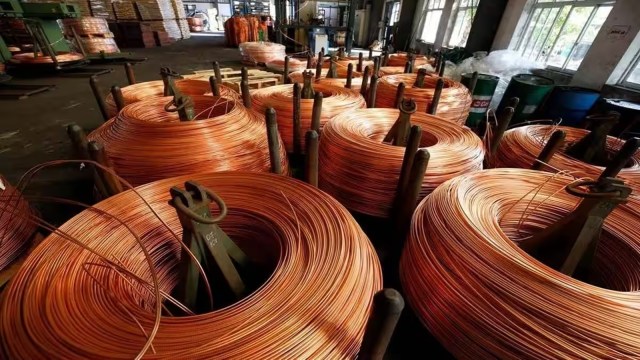Sufficient suppliers by mid-December, no copper shortage expected, says Mines Ministry
The Indian Express had reported Friday that downstream users of refined copper had warned the government of a looming supply crunch that could last for over three months
 Earlier, downstream user associations informed the ministry that the QCO has already triggered a 90-day shortage and urged the government to delay its implementation by four months.
Earlier, downstream user associations informed the ministry that the QCO has already triggered a 90-day shortage and urged the government to delay its implementation by four months.India will have sufficient suppliers of refined copper, both domestic and foreign, certified by the Bureau of Indian Standards (BIS) by mid-December, the Ministry of Mines said Friday. As a result, “no serious supply side constraint is envisaged,” it said in a press release. The ministry noted that until Adani Group’s new copper smelter in Gujarat reaches full capacity by March, India will continue to rely on imports for some of its refined copper needs.
The Indian Express had reported Friday that downstream users of refined copper had warned the government of a looming supply crunch that could last for over three months. These concerns stem from delays in certifying Japanese suppliers, who account for a large chunk of India’s copper imports. The certification became mandatory after the Quality Control Order (QCO) for refined copper came into effect on December 1.
“As of now, 7 applications from Japanese smelters have been received for BIS certification, of which one smelter (Sumitomo Metal Mining Co. Ltd.) has already been granted license. As per information received from BIS, two more licenses will be granted by next week,” the ministry said.
“In FY 2023-24, India imported about 363 Thousand Tonnes (THT) of refined copper cathode (HS Code: 740311), valued at Rs. 24,552 crore. Japan accounts for about 2/3rd (67%) of the refined copper imports. In quantity terms, about 69% of India’s refined copper imports come from Japan. Tanzania is India’s second important source of refined copper, contributing about 18% of the imports; followed by Mozambique with a share of about 5%,” it added.
Earlier, downstream user associations informed the ministry that the QCO has already triggered a 90-day shortage and urged the government to delay its implementation by four months. According to these associations, Japanese suppliers—who provide the bulk of India’s copper imports—halted shipments in mid-October to avoid clearance issues once the QCO took effect on December 1. They warned that any copper shipped now would take up to 45 days to arrive, leading to a potential supply crunch that could last three months.
“Presently, four domestic suppliers namely, Adani’s Kutch Copper Ltd, Hindalco Industries Ltd, Gujarat Victory Forgings Pvt Ltd & Vedanta Ltd and four foreign suppliers, one each from Japan and Austria, and two from Malaysia have been certified by BIS to supply copper cathode to Indian market. Thus, with 4 domestic BIS certified suppliers & 4 foreign BIS certified suppliers and another two certifications by mid of Dec, 2024, no serious supply side constraint is envisaged,” the ministry said.
In 2023-24, imports from Austria and Malaysia were only 1 per cent in value terms. Refined copper imports from Japan were worth Rs 16,500 crore.
In the release, the ministry said that it held several stakeholder consultations and extended the QCO twice “taking into account the supply situation”.
“Secretary (Mines) held a meeting with DG BIS on 17.1.2024 in which besides BIS & Ministry officials, industry representatives also attended. Thus, a sufficient period of 15 months, from 31st August, 2023, onwards was allowed to the domestic and foreign suppliers of Copper cathodes to obtain the Bureau of Indian Standards (BIS) certification,” it said.
“M/s Adani’s Kutch Copper Refinery has since come into production. However, as per company officials, ramp-up to full capacity will require some more time (about Feb-March 2025). Once achieved, India will be self-sufficient in refined copper, and will not have to rely on imports. Till that time, some amount of import of refined copper will take place,” the ministry added.
Adani Enterprises Ltd’s newly commissioned copper smelter in Kutch is expected to reach its peak capacity of 5 lakh tonnes per annum by 2025-26, according to details shared in the company’s latest earnings call.
Currently, Aditya Birla Group’s Hindalco leads with the largest operational refining capacity of approximately 5 lakh tonnes, followed by Vedanta at around 2 lakh tonnes. Gujarat Victory Forgings Pvt Ltd also operates with a smaller capacity of 6,000 tonnes per annum. Notably, all these producers have received BIS certification.
India was self-sufficient in copper cathode until 2018, when Vedanta’s Tuticorin plant was shut down over alleged environmental violations.





- 01
- 02
- 03
- 04
- 05


























